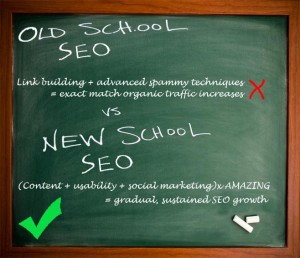Is SEO Going The Way Of The Dodo Or Is It More Like The Phoenix?
If you are using the internet to search for information then you will probably use a search engine, such as Google or Yahoo. The beauty of a search engine is that you can be as specific or vague about the information you  require and it will give you results. As a user this is very useful as it will give you hundreds of pages of potential sites. From a business point of view this is very bad. If, for example, you are running a small bicycle repair website, your website may be ranked 500th on a list. Most users only look at the first two or three pages of search results and you are probably on page 74.
require and it will give you results. As a user this is very useful as it will give you hundreds of pages of potential sites. From a business point of view this is very bad. If, for example, you are running a small bicycle repair website, your website may be ranked 500th on a list. Most users only look at the first two or three pages of search results and you are probably on page 74.
Search Engine Optimisation (SEO), is part of a set of tools grouped under the term Search Engine Marketing (SEM). SEM can help move your website up the page rankings, but an integral part of SEM is SEO and it is the future of this that we will be looking at here today.
There is talk that SEO is a dying methodology:
If you want to rank high on Google, build a good site and market it the best you know how. Just don’t expect SEO to be the answer to your traffic-related prayers because, increasingly, it won’t be.
But I would tend to disagree, the problem is that there are a lot of people out there who understand the principles of SEO but do not know how to deploy it in their website content. SEO can boost average content up the rankings by effective keyword density. But when people talk about Google being worried by users being ˜underwhelmed with their search results”, this is not Google acting in the best interest of a streamlined globally available knowledge base but Google trying to protect its self-image.
Old School SEO
To understand why this is happening, how this is happening and what we can do about it, we need to understand the origins of SEO. Early search engine algorithms indexed search results using a keyword principle. Going back to our previous example, in the early days of search engines your search for ‘bicycle repair’ would display webpages that have the word ‘bicycle’ and ‘repair’ in their webpage meta tags. Furthermore, it would rank the pages by the number of times those words appeared on that webpage.
White Hat SEO
Like the hacker term, white hat means ethical. So a white hat search engine optimiser will populate their meta tags with enough keywords to give the page a decent ranking while still being true to the content.
Black Hat SEO
Inversely, a black hat optimiser will flood their meta tags and page with every keyword they can think of, even if it is unrelated to the theme of the site, in order to improve their rankings.
This is probably why people developed a bad taste for SEO. Because it is easy to manipulate, it has an underhanded hue about it.
In 1998, Google appeared on the internet and was an instant success. Google is not a fan of having their search and indexing algorithms manipulated so employ other factors into their indexing. This countered some of the more aggressive SEO techniques and resulted in users having better access to more relevant content. Google also looks at links, the site map of the website, pictures and videos used etc. etc. Google also offer paid services to allow companies to advertise their site or push their site up the rankings.
The end of SEO?
With Google being the weapon of choice for more than half the web searches done, globally, and Google’s abhorrence to SEO, an opinion which they neatly double underlined in 2013, when they stopped publishing data on keyword popularity. After this, web marketing operators and analysts hinted that this may be the final nail in the coffin for keyword based optimisation. This, however, is simply not the case.
Content Is King
In the beginning, SEO was a way of increasing your page ranking by effective use of meta tags, and for a while this was good. Then Google threw a spanner in the works, introduced a whole new set of web marketing tools and began to beat SEO with the wet end.
Google’s defence is that users should be provided with quality content and not manipulated onto websites which are either poorly conceived but expertly marketed or purely exist for malicious purposes. So SEO needs to evolve, if Google wants content to be king, and let’s face it, if Google is God, then that is where SEO needs to go.
The SEO Phoenix
The current market for SEO related material is for short articles about specific content that has specific keywords in it, the same old SEO we know. But the focus has shifted from keyword stuffed titles and content to the production of actual articles. Instead of writing SEO off as extinct, we should be looking to the future.
Google has been pushing for this for a few years, that is why it surprised me when I came here in January to see that Etsy is using the “Search Engine Manipulation” model of SEO, which Google hates. That is why I am VERY Careful how I list, and title my items, I try to balance the two with leaning a bit more toward Google. (discussion board post: https://www.etsy.com/in-en/teams/7718/questions/discuss/14919048/page/2?post_id=232445881)
From the ashes of failed keyword stuffed articles comes an opportunity for SEO companies and writers to apply tried and tested SEO strategies to a client’s existing content. Keywords are always going to be used by search engines. Instead of employing black hat techniques like Etsy’s spamdexing to counter sophisticated algorithms, SEO needs to evolve into a highly specialised writing craft, a craft where informed creative writing, by quality writers who know how to research a topic, is used to enhance a website’s content and therefore page ranking. As long as the web, as we know it, exists, keywords will continue to be relevant. SEO isn’t going anywhere, it is us, the optimisers who need to adapt in our approach to SEO to make it work for both the companies that employ us and the search engines that scrutinise our content.


Magnificent goods from you, man. I have understand your stuff previous to and you’re just too fantastic. I actually like what you’ve acquired here, certainly like what you’re saying and the way in which you say it. You make it enjoyable and you still care for to keep it sensible. I can’t wait to read far more from you. This is really a wonderful website.
Josh, The basic idea is very simple and you just have to create an element and set an unique ID for it. And use that ID at the end of URL with pound sign (number mark, hashtag) “#” between. For example. On our website comment section has an ID “Comments” therefore we can easily link to this section by creating an URL like this https://colorlib.com/wp/best-one-page-wordpress-themes/#comments Once you click this URL you will get moved to the vey top of comment section for this post. As simple as that. That’s the basic idea behind all one page WordPress themes but this concept is combined with some CSS and JavaScript to smoother transitions and make it more alive. But the basic idea is still there.